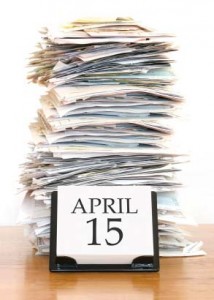 Why would I think these three words, patience, priorities and persistence, have anything to do with tax season? Do you think these words might also apply to the IRS?
Very recently, yes during tax season, I came back from a business meeting to find my office computer server had crashed. If you are one of my clients who had a tax appointment with me the third week of March, you know how our time was spent.
Tax season time is limited and I meet with several clients every day, six days a week. Sundays, after church, I work on completing returns whose outstanding information had been received. Every day in tax season is like a week in any other job. I easily spend 90 hours a week during tax season!
Usually I sit down with a client and together we build your tax return. I enter your tax data as we talk about things that apply to your unique tax situation. But after my server crashed, I was temporarily unable to access the professional software I rely on to craft your accurate return, I couldn’t even send or receive email! YIKES!
Here’s where establishing priorities comes in….
Could my server be repaired? Would my server need to be replaced? I placed an emergency call to my trusted computer technician and he came to my office on Monday. Computer Doctor, Patrick (not his real title), took my sick machine to what I call his ‘high tech hospital’ to diagnose the problem.
Knowing I had a full calendar of appointments, and April 15th was only four weeks away, I had to make the best use of the time available. Rescheduling appointments was out of the question. Using the client tax organizer I send each of you right after Christmas, I gathered the tax information I would later enter into the computer.
I had great conversations with my clients and we got to know each other even better. I leaned that even McDonald’s has to close their doors when their computers are down. Kitchen timers and cash registers are computer driven.
Patrick called with good news and bad news. The good news was that my client data was safe, secure, and uncompromised. Protecting my data from breeches and doing frequent and regular backups really paid off. I did need a new server. Patrick would load my data on the new server and install it for me on Saturday.
A whole week without tax software access made me think back to the early days when I used pencil and paper tax forms. Preparing returns “by hand” is not an option today. I learned how to quiet my racing mind by taking deep breaths. During my “down time” I completed some administrative work that is usually saved for after April 15th.
I learned firsthand the true meaning of patience. I took a good look at what could be done and prioritized what would be done first. With the installation of the new server, it is time to practice persistence. Now I can enter that tax data I gathered during our appointments. As soon as my electronic filing cabinet (my data storage software system) is restored, I will print the tax returns everyone is waiting for.
Soon these tax returns will be electronically filed to the IRS and the tax cycle will be complete.
Why would I think these three words, patience, priorities and persistence, have anything to do with tax season? Do you think these words might also apply to the IRS?
Very recently, yes during tax season, I came back from a business meeting to find my office computer server had crashed. If you are one of my clients who had a tax appointment with me the third week of March, you know how our time was spent.
Tax season time is limited and I meet with several clients every day, six days a week. Sundays, after church, I work on completing returns whose outstanding information had been received. Every day in tax season is like a week in any other job. I easily spend 90 hours a week during tax season!
Usually I sit down with a client and together we build your tax return. I enter your tax data as we talk about things that apply to your unique tax situation. But after my server crashed, I was temporarily unable to access the professional software I rely on to craft your accurate return, I couldn’t even send or receive email! YIKES!
Here’s where establishing priorities comes in….
Could my server be repaired? Would my server need to be replaced? I placed an emergency call to my trusted computer technician and he came to my office on Monday. Computer Doctor, Patrick (not his real title), took my sick machine to what I call his ‘high tech hospital’ to diagnose the problem.
Knowing I had a full calendar of appointments, and April 15th was only four weeks away, I had to make the best use of the time available. Rescheduling appointments was out of the question. Using the client tax organizer I send each of you right after Christmas, I gathered the tax information I would later enter into the computer.
I had great conversations with my clients and we got to know each other even better. I leaned that even McDonald’s has to close their doors when their computers are down. Kitchen timers and cash registers are computer driven.
Patrick called with good news and bad news. The good news was that my client data was safe, secure, and uncompromised. Protecting my data from breeches and doing frequent and regular backups really paid off. I did need a new server. Patrick would load my data on the new server and install it for me on Saturday.
A whole week without tax software access made me think back to the early days when I used pencil and paper tax forms. Preparing returns “by hand” is not an option today. I learned how to quiet my racing mind by taking deep breaths. During my “down time” I completed some administrative work that is usually saved for after April 15th.
I learned firsthand the true meaning of patience. I took a good look at what could be done and prioritized what would be done first. With the installation of the new server, it is time to practice persistence. Now I can enter that tax data I gathered during our appointments. As soon as my electronic filing cabinet (my data storage software system) is restored, I will print the tax returns everyone is waiting for.
Soon these tax returns will be electronically filed to the IRS and the tax cycle will be complete.
0


